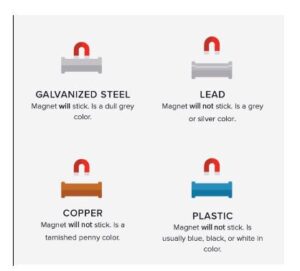The City of Yates Center Announces Lead and Copper Rule (LCR) Program
Explore the newly updated LCR policy and how it applies to your property
May 1, 2024
The Environmental Protection Agency (EPA) recently rolled out new regulations for its existing Lead and Copper Rule (LCR) policy. One of the new requirements states that all public water systems must complete an inventory of water service lines within their jurisdiction to help identify remaining lead service lines. This inventory of information is not only important for public water systems like those in the City of Yates Center to know, but it is also essential to protecting and improving public health in the city and the surrounding area. Explore this webpage to learn more about the newly updated policy and how it impacts customers of the city.
What is the Lead and Copper Rule (LCR)?
The LCR was first passed in 1991, but there have been multiple revisions to the policy since its passing. The latest round of updates came in November 2023.
In the newest version of the law, public water systems are now required to develop (and maintain) a Lead Service Line (LSL) inventory. This information will be used to help develop a future replacement plan for all known LSLs. For now, however, public water systems only need to focus on developing the inventory and recording all known LSLs in their service area. The creation of the inventory must be completed by October 2024.
More information about developing a replacement plan is anticipated to come later following the completion of the inventory. However, for now, federal and state agencies recommend cities only focus on developing and maintaining the inventory.
Conducting the Water Service Line Inventory
For most homes and buildings built after 1988, the presence of lead is less prevalent. However, there is still a chance that lead material could have been used in residential service lines following this date. For this reason, it is important for all property owners in the city to conduct their own on-site inspection and determine what material type their water service line is made of – lead, copper, galvanized steel, or plastic.
To complete the EPA’s required service line inventory, the City of Yates Center will need property owners’ assistance with verifying service line material. Through basic tests or observation, property owners can provide the City of Yates Center with what type of material their service line is made of – lead, copper, galvanized steel, or plastic. Follow these basic steps to determine what your service line material is and use the online self-reporting tool to share your findings with the City of Yates Center.
- Find the water shut-off valve on your property – located likely in your basement or utility closet.
- Look for the pipe that comes through the outside wall or floor of your home that connects the water meter to your home or building.
- If the pipe is painted, use sandpaper or a key to expose a small section of the metal.
- Determine your service line material using the provided reference guide.
- Send us your results using this link https://arcg.is/1Srm191 (preferred method) or submit the Water Line Inspection Form in writing to the City of Yates Center (Form available under the FORMS tab above.)

If after completing your own inspection you are still not sure what material your service line is made of, reach out to the City of Yates Center for assistance completing your inspection.
The Dangers of Lead
For years, we have known lead is a toxic metal that was once prevalently used in daily products, materials, and the construction of buildings. Despite it being banned from use, lead is still found in old and existing materials across the state, including private water service lines. Measures in the last two decades aimed at addressing lead material in water service lines have greatly reduced exposure to lead in our communities. However, as stated previously, lead can still be found in the water service lines of homes and properties, especially those older than 1978. The only way to know for sure if your water service line contains lead, is to conduct an on-site inspection or get your water tested.
Funding for this assistance is provided through a contractual agreement between the Kansas Department of Health & Environment State Revolving Fund Set-aside and JEO Consulting Group.
Contact Information
The City of Yates Center
(620) 625-2118
City of Yates Center 117 E. Rutledge St. Yates Center, KS 67782
